Nergaard might be getting old, but he is just as sharp as ever. In his heyday, Nergaard’s elite bomb detection skills saw him deployed in some of the most heavily mined war zones around the world.
From scouring landmines in rebel-controlled areas in Colombia, to clearing one of the most heavily militarised borders between Israel and Lebanon, to minefields in Iraq. Countless lives have been saved thanks to this veteran’s work, with vast swathes of land freed for people to live and survive on.
After his final clearance stint in Cambodia, a country still ravaged by unexploded ordnance, he retired four years ago. Nergaard was just ten years old.
Nergaard is a Belgian Malinois, part of the Norwegian People’s Aid (NPA) explosive detection dog team, who have been using canines for the best part of 28 years clearing explosive remnants in war-affected countries around the world.
“The dogs have been working for decades, helping humanity in such a huge way,” Yulia Khouri, founder of Phnom Penh-based dog retirement shelter Home of Heroes, explained.
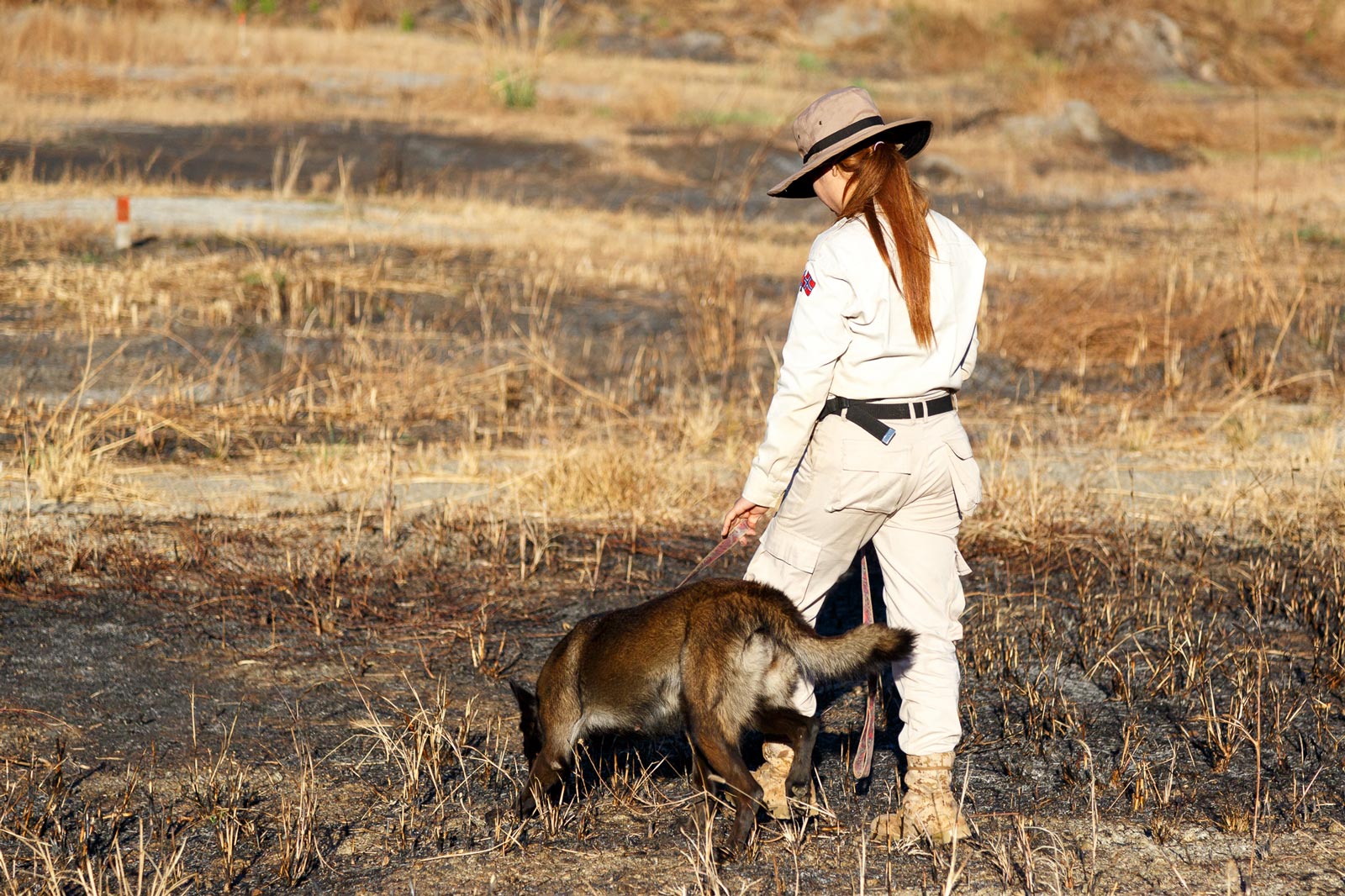
An NPA deminer and her Malinois dog at their training field in Ratanakiri, in Cambodia’s northeast. Photo: Miriam Deprez
Like most bomb-sniffing dogs, she said, Nergaard cleared anywhere between three to five million square metres of land in his life, a feat worthy of celebration. Yet once they get too old for service, if they cannot be adopted, these highly intelligent hounds are decommissioned and put down.
“There’s absolutely no global solution for demining dogs in terms of their retirement,” the Ukrainian-Canadian ex-pat said. “This struck me as not only inappropriate but downright criminal that these heroes face euthanasia as their final solution.”
So in 2016, already sheltering hundreds of animals, Khouri founded the world’s first retirement home for decommissioned detection dogs in Cambodia’s capital. It now shelters 18 ex-NPA dogs.
Cambodia, like many war-ravaged countries across the world, was left with a deadly legacy decades after the conflict ended in the form of unexploded mines and bombs.
Intense bombing raids by US forces during the 1960s and 70s, and then later with the Khmer Rouge regime, left Cambodia laden with millions of deadly relics. Cambodia is home to one of the world’s largest minefields called the K-5 barrier. With an estimated two million mines, it runs the length of the Thai-Cambodian border.
With an economy based on farming and agriculture, the prospect for civilians tilling the soil was too often a choice between risking striking a landmine, or facing certain death from starvation. According to NPA figures, 64,000 people have fallen victim to unexploded ordnance in Cambodia – many of which are children.
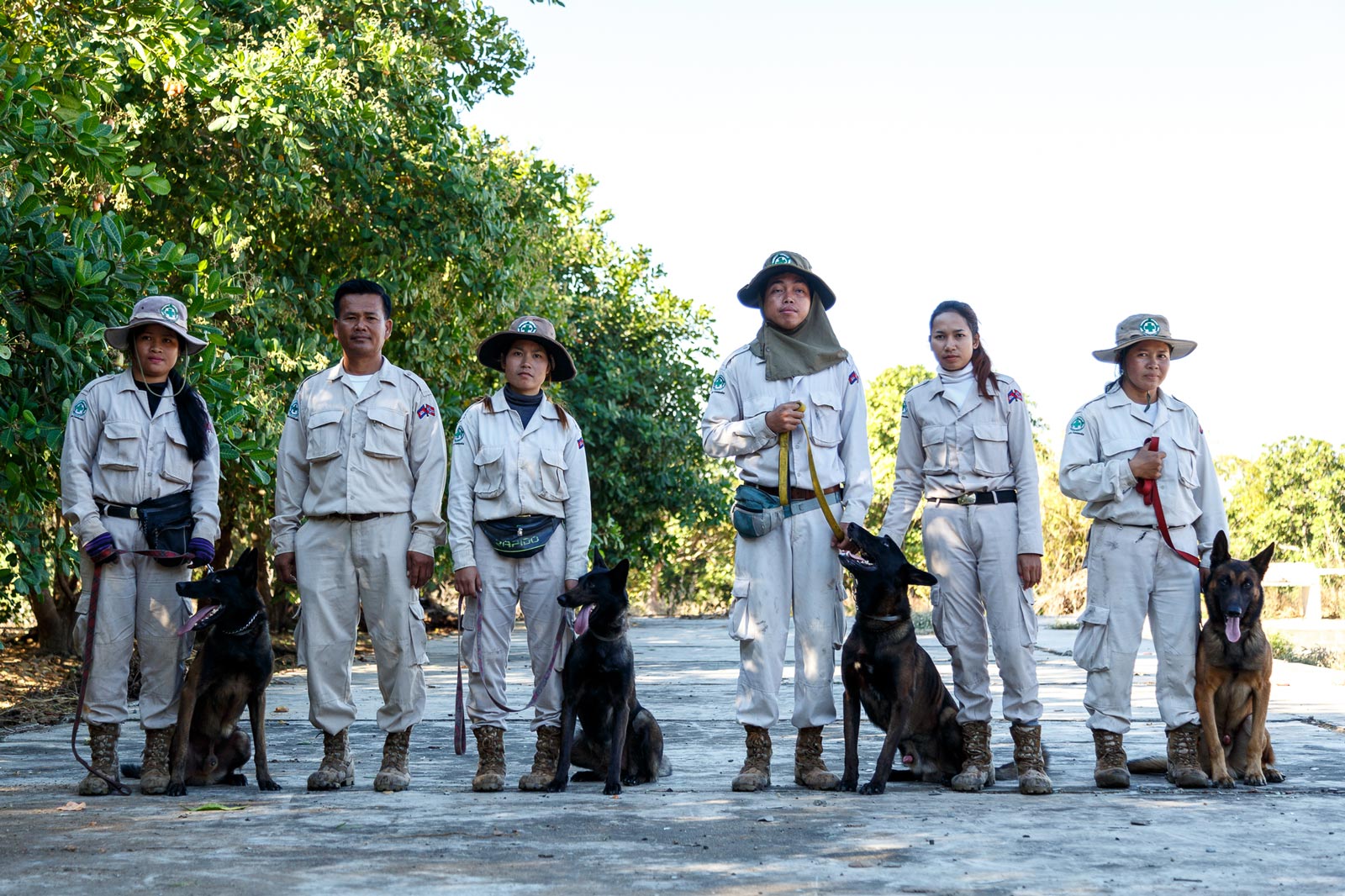
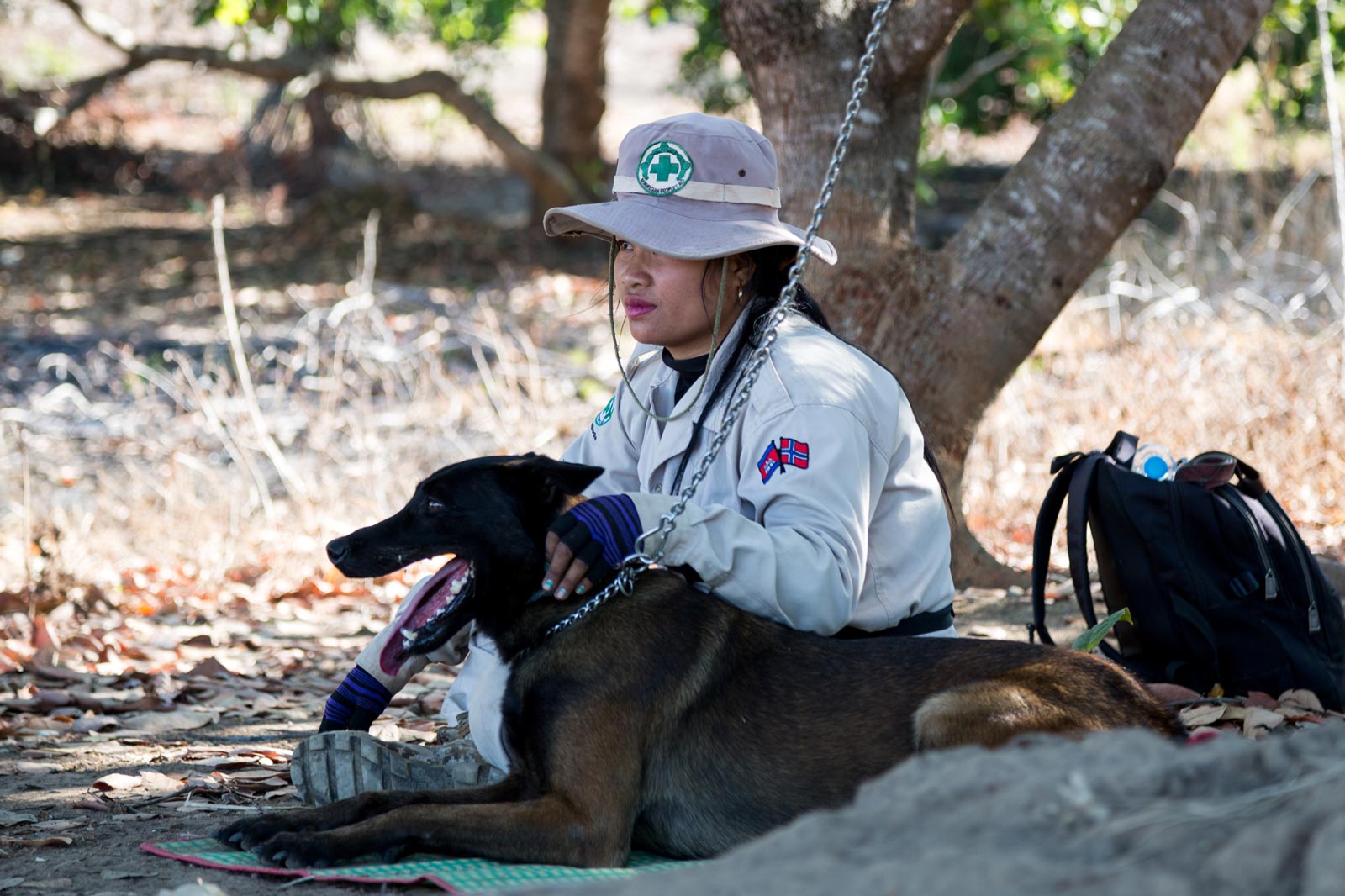
The bond between handlers and the dogs is strong, both must trust each other as they work in dangerous conditions. Photo: Miriam Deprez
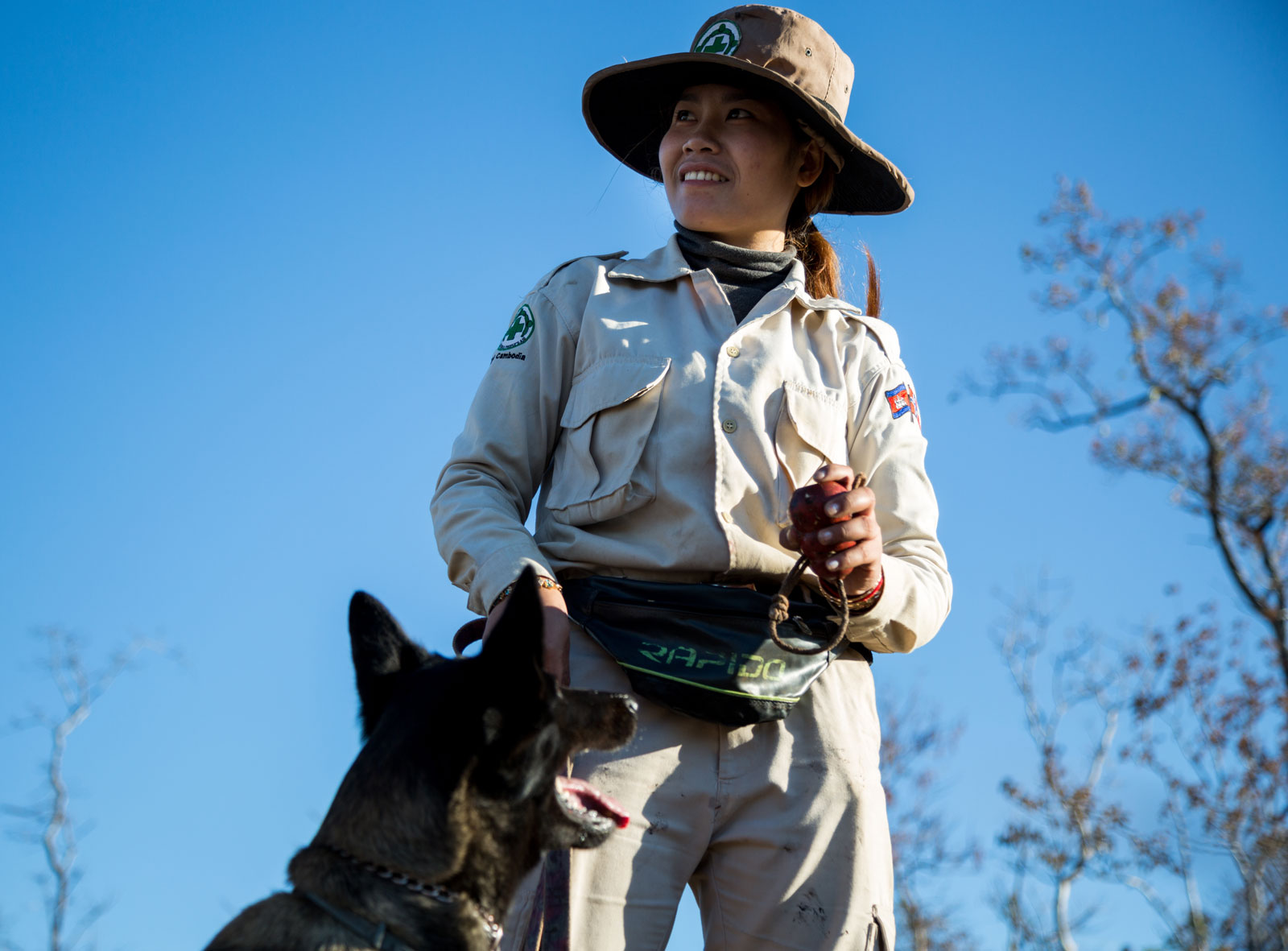
After two decades of demining, it is estimated that only half of the countries war remnants have been cleared, and Cambodia remains one of the most heavily mined countries in the world.
Alongside other demining organisations, NPA began demining in Cambodia in 1992, using highly trained sniffer dogs as part of their detection arsenal. Today there are over 500 dogs like Nergaard working around the globe, from Africa, the Middle East, South America and Southeast Asia, born to make the world safe.
Meticulously smelling the earth, these dogs can work in almost all types of terrain Khouri said. “They can smell the tiny, tiny speck of TNT meters into the ground.”
Khouri explained that their accuracy is uncompromising, and their track record is impressive considering the thousands of mines they discover during their working lives. “With nearly 30 years of using dogs, there has never been an accident globally ever,” she stated. “Basically the handlers life is 100% dependent on the accuracy of the dog and how [the dog] responds to that handler.”
“These dogs are the effort. These dogs are the deminers, without them there is nothing,” Khouri said.
So after being shocked to discover that death is the likely outcome for these dogs, Khouri pitched NPA with the idea of a retirement home. “They were quite keen on it right away,” she said, describing how it didn’t take long for them to sign a memorandum of understanding with her organisation that they will look after all the dogs who are either retiring or decommissioned for one reason or the other.
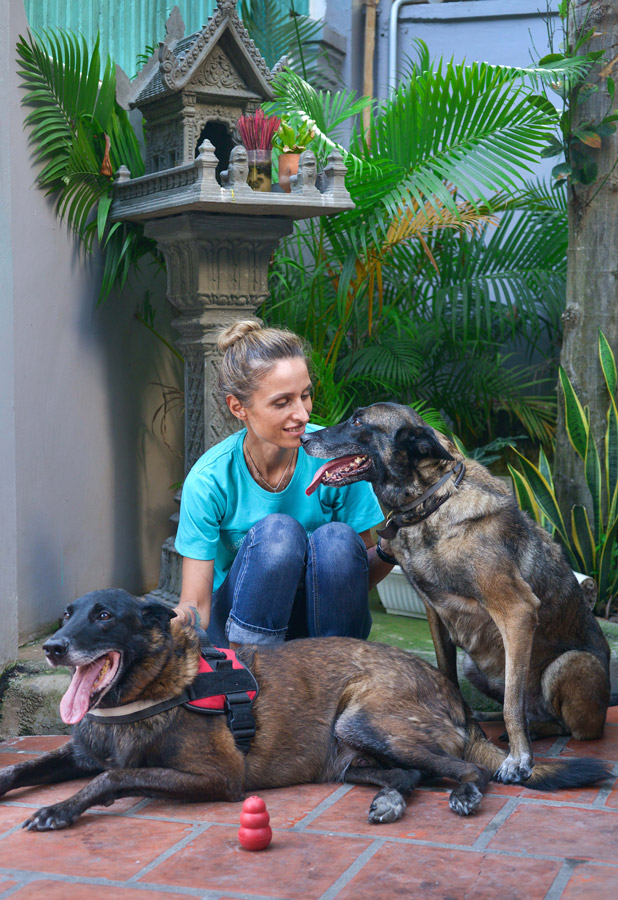
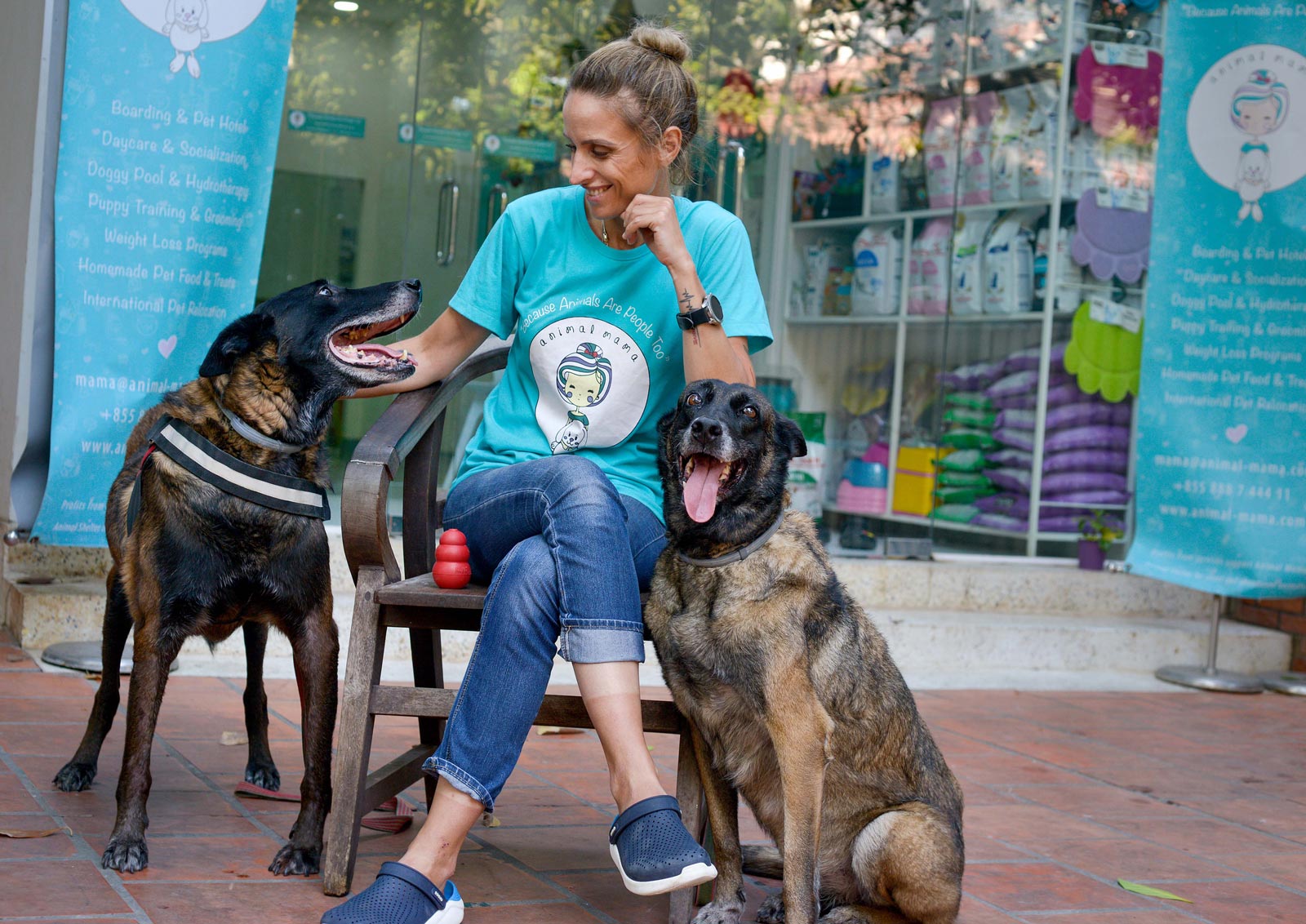
They’re usually very eager to work. I mean, for us we call it work, but for them, it’s all play
Yulia Khouri, founder of dog retirement shelter Home of Heroes
Bred specifically for their intelligence and agility, the Belgian Malinois make for difficult pets. “They’re highly, highly, intelligent and energetic,” Khouri said, which makes them unpopular for adoption. “They really need to consistently be engaged in something and some type of high energy working environment or they will get very bored and very distracted.”
Since December, Home of Heroes has expanded to a location in Siem Reap, and are looking for new ways to keep the dogs active and sustain the centre. Khouri, along with three other trainers, continuously look at new ways of how they can redeploy the dogs.
“So we’re now trying to train a couple of our dogs to find [animal] snares, and also train them in protection in case the rangers find themselves facing criminals in the forest,” she explained, saying illegal animal snaring is having a huge impact on the Cambodian environment.
Khouri assured that all their training is done with positive reinforcement. “They’re usually very eager to work. I mean, for us we call it work, but for them, it’s all play.”
Despite the novel initiative, Khouri says they struggle for financial support, often finding it difficult to garner backing in a country with extreme poverty. “Often we hear things like, ‘don’t you want to feed the children?’ So often it is difficult to ask for donations for the dogs.”
Currently, Home of Heroes is self-funded with limited donations. “It’s actually like a personal project for now,” Khouri explained. “And hopefully, once the dogs are ready to fund themselves, that would be great. But at the moment there is no funding.”
But in the end, for Khouri it’s all about giving the dogs a loving and secure home. “It’s really great to see the dogs retrained for different purposes,” she said. “Just knowing that these dogs are never going to face euthanasia as their last resort because they will always be our dogs and they will always have Home of Heroes here as their final home,” Khouri said.
Thanks to Khouri, war veterans like Nergaard, now reaching a ripe old age of 14, can live out the rest of his days in dignity.



